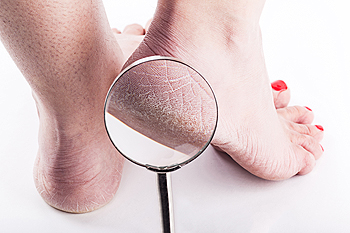Connect With Us
Blog
Disadvantages of Wearing High Heels
 Wearing high heels may possibly be the reason why many women experience foot pain. Despite the fact that most women think high heels flatter the appearance of their legs, several issues may develop as a result of wearing this type of shoe. When high heels are worn, the foot is often in an unnatural position, which may inhibit blood circulation to the feet. The purpose of the Achilles tendon is to connect the calf to the heel. A disadvantage of wearing high heels is that heels may cause this tendon to become stiff and inflamed, possibly resulting in the development of additional foot ailments. Recent research has shown that moderation is the key to wearing high heels, and limiting the number of days they are worn may benefit the overall well-being of the foot. If you experience discomfort and pain from wearing high heels, please consult with a podiatrist to learn about proper stretching techniques for the foot.
Wearing high heels may possibly be the reason why many women experience foot pain. Despite the fact that most women think high heels flatter the appearance of their legs, several issues may develop as a result of wearing this type of shoe. When high heels are worn, the foot is often in an unnatural position, which may inhibit blood circulation to the feet. The purpose of the Achilles tendon is to connect the calf to the heel. A disadvantage of wearing high heels is that heels may cause this tendon to become stiff and inflamed, possibly resulting in the development of additional foot ailments. Recent research has shown that moderation is the key to wearing high heels, and limiting the number of days they are worn may benefit the overall well-being of the foot. If you experience discomfort and pain from wearing high heels, please consult with a podiatrist to learn about proper stretching techniques for the foot.
High heels have a history of causing foot and ankle problems. If you have any concerns about your feet or ankles, contact one of our podiatrists from Foot & Ankle Associates of Maine. Our doctors can provide the care you need to keep you pain-free and on your feet.
Effects of High Heels on the Feet
High heels are popular shoes among women because of their many styles and societal appeal. Despite this, high heels can still cause many health problems if worn too frequently.
Which Parts of My Body Will Be Affected by High Heels?
- Ankle Joints
- Achilles Tendon – May shorten and stiffen with prolonged wear
- Balls of the Feet
- Knees – Heels cause the knees to bend constantly, creating stress on them
- Back – They decrease the spine’s ability to absorb shock, which may lead to back pain. The vertebrae of the lower back may compress.
What Kinds of Foot Problems Can Develop from Wearing High Heels?
- Corns
- Calluses
- Hammertoe
- Bunions
- Morton’s Neuroma
- Plantar Fasciitis
How Can I Still Wear High Heels and Maintain Foot Health?
If you want to wear high heeled shoes, make sure that you are not wearing them every day, as this will help prevent long term physical problems. Try wearing thicker heels as opposed to stilettos to distribute weight more evenly across the feet. Always make sure you are wearing the proper shoes for the right occasion, such as sneakers for exercising. If you walk to work, try carrying your heels with you and changing into them once you arrive at work. Adding inserts to your heels can help cushion your feet and absorb shock. Full foot inserts or metatarsal pads are available.
If you have any questions please feel free to contact our office located in Brunswick, ME . We offer the newest diagnostic and treatment technologies for all your foot and ankle needs.
Howie Kendrick Tears Achilles Tendon
 Washington Nationals infielder Howie Kendrick recently tore his Achilles tendon in the first game of a doubleheader against the Los Angeles Dodgers. Kendrick was seen walking on crutches while wearing a walking boot in the Nationals’ clubhouse after the game. This is expected to be a season-ending injury for Kendrick and he states, “I really knew there was something wrong with it because I couldn't control my heel at all, so that's when I knew it was probably my Achilles.” He was immediately placed on the 10-day disabled list and was replaced on the roster by right-hander Jefry Rodriguez from the Nationals’ Double-A affiliate in Harrisburg.
Washington Nationals infielder Howie Kendrick recently tore his Achilles tendon in the first game of a doubleheader against the Los Angeles Dodgers. Kendrick was seen walking on crutches while wearing a walking boot in the Nationals’ clubhouse after the game. This is expected to be a season-ending injury for Kendrick and he states, “I really knew there was something wrong with it because I couldn't control my heel at all, so that's when I knew it was probably my Achilles.” He was immediately placed on the 10-day disabled list and was replaced on the roster by right-hander Jefry Rodriguez from the Nationals’ Double-A affiliate in Harrisburg.
Achilles tendon injuries need immediate attention to avoid future complications. If you have any concerns, contact one of our podiatrists of Foot & Ankle Associates of Maine. Our doctors can provide the care you need to keep you pain-free and on your feet.
What Is the Achilles Tendon?
The Achilles tendon is a tendon that connects the lower leg muscles and calf to the heel of the foot. It is the strongest tendon in the human body and is essential for making movement possible. Because this tendon is such an integral part of the body, any injuries to it can create immense difficulties and should immediately be presented to a doctor.
What Are the Symptoms of an Achilles Tendon Injury?
There are various types of injuries that can affect the Achilles tendon. The two most common injuries are Achilles tendinitis and ruptures of the tendon.
Achilles Tendinitis Symptoms
- Inflammation
- Dull to severe pain
- Increased blood flow to the tendon
- Thickening of the tendon
Rupture Symptoms
- Extreme pain and swelling in the foot
- Total immobility
Treatment and Prevention
Achilles tendon injuries are diagnosed by a thorough physical evaluation, which can include an MRI. Treatment involves rest, physical therapy, and in some cases, surgery. However, various preventative measures can be taken to avoid these injuries, such as:
- Thorough stretching of the tendon before and after exercise
- Strengthening exercises like calf raises, squats, leg curls, leg extensions, leg raises, lunges, and leg presses
If you have any questions please feel free to contact our office located in Brunswick, ME . We offer the newest diagnostic tools and technology to treat your foot and ankle needs.
Home Remedy for Cracked Heels
 It is easy to forget to pay special attention to the heels of your feet when moisturizing. If there is an insufficient amount of moisture in the heels of our feet, they can crack easily. You may be prone to cracked feet if you are often dehydrated, take very hot showers, or excessively scrub your feet. Fortunately, there are some home remedies you can try if you are experiencing problems with cracked heels. This remedy involves both banana and coconut oil; both of these ingredients are known for their great moisturizing properties. In order to create the mixture, mix one ripe banana with a quarter cup of coconut oil and apply all over the feet. Let the mixture rest for 20 minutes before rinsing it off with cold water. This is a natural method that can be used to heal cracked feet. If you have any questions regarding cracked heels or are looking for advice on how to care for cracked heels, a consultation with a podiatrist is advised.
It is easy to forget to pay special attention to the heels of your feet when moisturizing. If there is an insufficient amount of moisture in the heels of our feet, they can crack easily. You may be prone to cracked feet if you are often dehydrated, take very hot showers, or excessively scrub your feet. Fortunately, there are some home remedies you can try if you are experiencing problems with cracked heels. This remedy involves both banana and coconut oil; both of these ingredients are known for their great moisturizing properties. In order to create the mixture, mix one ripe banana with a quarter cup of coconut oil and apply all over the feet. Let the mixture rest for 20 minutes before rinsing it off with cold water. This is a natural method that can be used to heal cracked feet. If you have any questions regarding cracked heels or are looking for advice on how to care for cracked heels, a consultation with a podiatrist is advised.
If the skin on your feet starts to crack, you may want to see a podiatrist to find treatment. If you have any concerns, contact one of our podiatrists from Foot & Ankle Associates of Maine. Our doctors can provide the care you need to keep you pain-free and on your feet.
Cracked Heels
It is important to moisturize your cracked heels in order to prevent pain, bleeding, and infection. The reason cracked heels form is because the skin on the foot is too dry to support the immense pressure placed on them. When the foot expands, the dry skin on the foot begins to split.
Ways to Help Heal Them
- Invest in a good foot cream
- Try Using Petroleum Jelly
- Ease up on Soaps
- Drink Plenty of Water
Ways to Prevent Cracked Heels
- Moisturize After Showering
- Skip a Shower
- Keep Shower Water Lukewarm
- Don’t Scrub Your Feet
If you are unsure how to proceed in treating cracked heels, seek guidance from a podiatrist. Your doctor will help you with any questions or information you may need.
If you have any questions, please feel free to contact our office located in Brunswick, ME . We offer the newest diagnostic and treatment technologies for all your foot care needs.
Foot Conditions That May Develop From Obesity
 Recent research has shown a connection between foot pain and being obese. Foot ailments that may develop as a result of obesity include flat feet, arthritis, diabetes and general heel pain. Obesity may alter the general structure of the foot as a result of the heels and ankles enduring additional pressure caused by excess weight. Exercising may become difficult due to an increase in weight, and this may hinder one's ability to shed the excess pounds. Your feet will benefit if you choose to wear wide and supportive shoes, although there may be a limited selection of larger sizes necessary to accommodate them. Implementing a daily exercise routine and maintaining a healthy lifestyle may aid in combating obesity. This can typically be achieved by slowly beginning to properly stretch and exercise the feet. Please consider scheduling a consultation with a podiatrist for a recommended exercise program that may avoid foot pain.
Recent research has shown a connection between foot pain and being obese. Foot ailments that may develop as a result of obesity include flat feet, arthritis, diabetes and general heel pain. Obesity may alter the general structure of the foot as a result of the heels and ankles enduring additional pressure caused by excess weight. Exercising may become difficult due to an increase in weight, and this may hinder one's ability to shed the excess pounds. Your feet will benefit if you choose to wear wide and supportive shoes, although there may be a limited selection of larger sizes necessary to accommodate them. Implementing a daily exercise routine and maintaining a healthy lifestyle may aid in combating obesity. This can typically be achieved by slowly beginning to properly stretch and exercise the feet. Please consider scheduling a consultation with a podiatrist for a recommended exercise program that may avoid foot pain.
The more you weigh, the harder your feet must work to support your body. If you’re an obese individual and are concerned about your feet, contact one of our podiatrists from Foot & Ankle Associates of Maine. Our doctors can provide the care you need to keep you pain-free and on your feet.
Obesity and Your Feet
People who are overweight are putting more pressure on their ankles, knees, and hips as well as their feet. This unfortunately can lead to variety of different issues.
Problems & Complications Stemming from Obesity
- When the body is overweight, it tries to compensate by changing the way that it moves. An obese person may lean forward and put extra weight on the wrong part of the foot. This puts unnecessary stress on the feet.
- Obese people are also more likely to develop type II diabetes which is a condition that causes a lot of foot problems. People with diabetes often don’t feel the cuts and sores that they may have on their feet, which can lead to more complicated and severe issues.
- Plantar fasciitis is another foot condition that can be caused by obesity. Plantar fasciitis is an inflammation of the tissue along the bottom of the foot, which causes pain and stiffness while walking and climbing stairs.
If you have any questions, please feel free to contact our office located in Brunswick, ME . We offer the newest diagnostic and treatment technologies for all your foot care needs.
